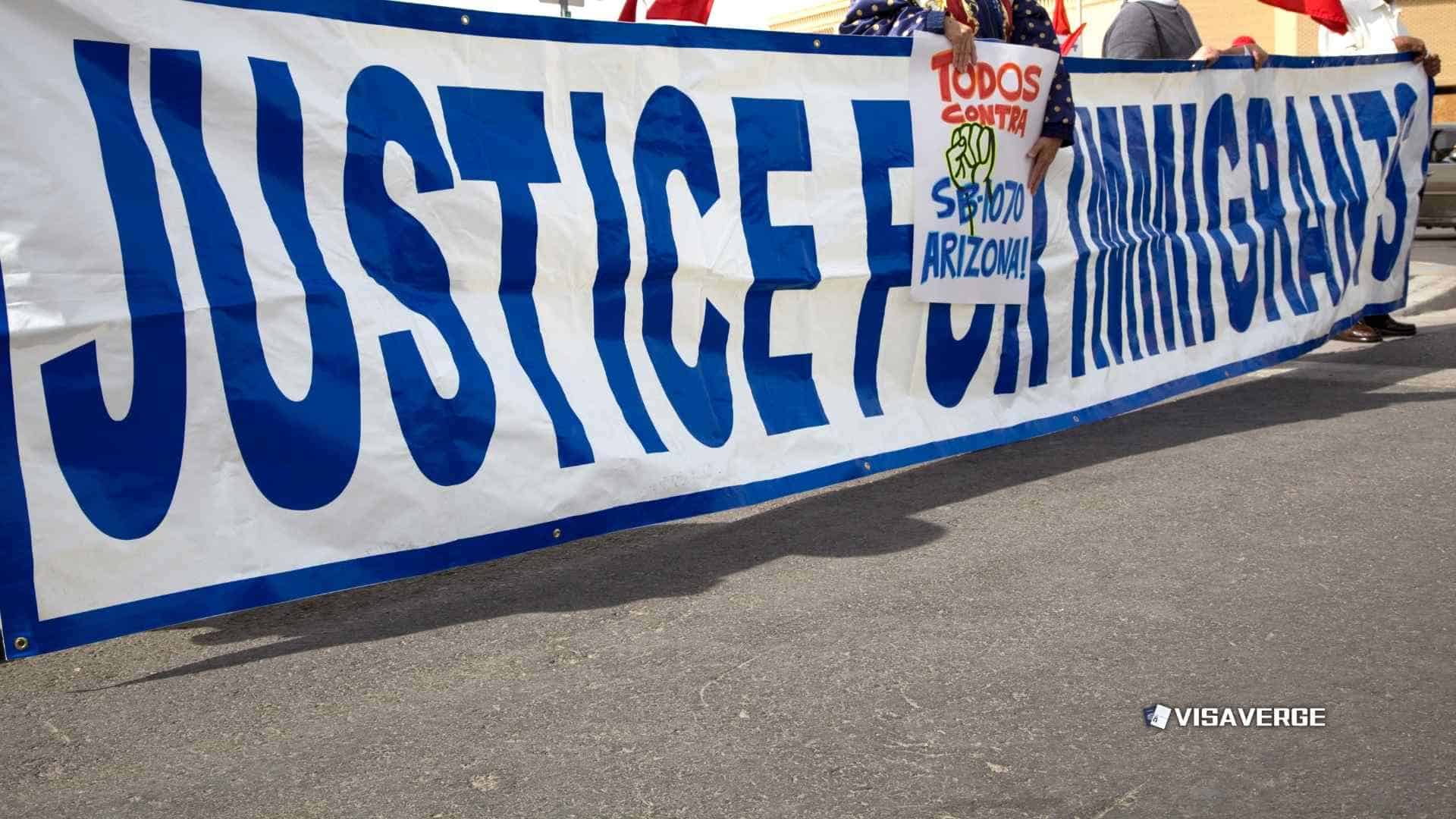(State leaders, legal experts, and community advocates warned that current immigration enforcement tactics are eroding basic rights at a packed town hall in Tampa on August 19, 2025. Speakers focused on the rapid spread of expedited removal and the shrinking room for due process, saying families in the United States 🇺🇸 face life-altering decisions without a chance to see a judge. The event, organized by a coalition of local Democratic caucuses and advocacy groups, featured testimony from attorneys, community organizers, and local media voices.)
Tampa immigration attorney Danielle Hernandez told attendees that an executive order issued in January 2025 rolled back protections for certain undocumented immigrants. She said people who cannot prove at least two years of continuous presence in the country and who entered between ports of entry can be placed in expedited removal — with deportation possible “in as little as one day” and no court hearing.

“Traditionally, immigrants could see an immigration judge and be told why they were detained,” Hernandez said, describing a sharp break from long‑standing practice. She added that anyone who entered the United States after April 2023 is especially vulnerable to arrest without the usual immigration court process.
Hernandez explained a key legal distinction: crossing the border without permission is generally a civil matter, while reentry after removal can trigger criminal charges — a difference that raises the stakes for people already living in fear. She also reported instances of canceled or terminated asylum cases and arrests at routine check-ins, developments that have surprised many.
Due process rollback and expedited removal
Speakers repeatedly linked the fast growth of expedited removal to the erosion of fundamental safeguards. Attorneys at the town hall said the process has allowed some removals to occur before people can gather documents, reach family, or speak with counsel.
“It’s the speed that upends lives,” Hernandez said, noting that check-ins that once reassured compliance now feel like trapdoors. VisaVerge.com reports that expedited removal typically bypasses immigration court hearings, a shift with immediate impact on families and employers alike.
The policy shift described at the event is already changing daily life for many immigrants in Florida:
- Routine interactions with enforcement — including scheduled visits at local offices — can now lead to arrest and removal.
- For parents, that can mean scrambling for child care plans.
- For workers, it can mean sudden job loss.
- The rollback of due process protections means swift decisions with little room to present evidence or seek legal defense.
For official background on expedited removal procedures, readers can consult the U.S. Customs and Border Protection page at https://www.cbp.gov/border-security/procedures/expedited-removal. The town hall speakers stressed that even knowing the formal rules often isn’t enough when removals can occur so quickly.
Community response and federal posture
Local groups described how they are pushing back. Tampa Bay Students for a Democratic Society and the Resistance Support Collective have organized rapid‑response efforts and protests, calling the tactics harsh and unfair.
On June 9, 2025, demonstrators gathered at Tampa City Hall in solidarity with communities affected by ICE raids elsewhere, including in Los Angeles. Organizers said these actions aim to support families and press for policy changes at every level of government.
At the same time, federal officials outlined a tougher environment for frontline officers. Secretary of Homeland Security Kristi Noem cited a 700% increase in attacks on ICE agents in 2025 compared with 2024, describing a climate that includes doxing, physical attacks, and violent protests.
Key federal enforcement figures highlighted at the forum:
- ICE’s budget: about $28 billion a year now, with plans reaching $75 billion through 2029
- Staffing goals: plans to hire more than 10,000 new agents
- Detention expansion: capacity goals to house 100,000 detainees
The overall signal from officials is clear: enforcement — and the capacity to carry it out quickly — is poised to intensify.
Patrick Manteiga, publisher of the tri‑lingual LaGaceta Newspaper, criticized the administration’s direction as “cruel and unusual,” saying the public is divided by fragmented media coverage. He called for a more united and empathetic conversation about immigration enforcement that recognizes both public safety concerns and core rights. His remarks drew long applause from a crowd that included families anxious about check‑ins and pending cases.
The coalition behind the event reflected broad local engagement: the Hillsborough County Democratic Hispanic Caucus, Jewish Caucus, LGBTQ+ Caucus, Caribbean Caucus, the League of United Latin American Citizens, and the Hillsborough Society all helped organize. U.S. Representative Kathy Castor participated, and her office was highlighted as a point of contact for constituents seeking help or information about policy developments.
Organizers encouraged affected residents to stay connected with their networks and to prepare family plans. They emphasized ongoing community actions such as know‑your‑rights sessions and coordinated support even as policy fights move to the courts and state capitols.
Practical realities and guidance for those at risk
Speakers emphasized several immediate, practical realities for people now at risk:
- Expedited timelines: Decisions and removals can happen very fast, sometimes within a day.
- Proof of presence: People unable to show at least two years of continuous presence are especially exposed.
- Check‑in risks: Routine appointments can lead to arrest, even for those who have complied for years.
- Case disruptions: Asylum proceedings may be canceled or terminated under current practice.
Attendees shared local impacts: neighbors avoiding driving to work, business owners scrambling for last‑minute legal help for staff, and students worrying about parents not returning from scheduled visits.
VisaVerge.com’s analysis noted that policies that compress timelines often leave less space for screening and legal advice, creating pressure points where mistakes can occur. Tampa speakers argued that restoring robust due process — especially the chance to see an immigration judge — would help ensure decisions are fair and more likely to be durable.
They also urged clearer, consistent communication about rights to reduce fear without compromising security.
“When a decision can come in a day, every hour matters.” — Danielle Hernandez
What attendees and organizers recommend
Organizers and speakers offered practical steps for people who may be affected:
- Seek trusted legal help early.
- Keep copies of key documents in safe, easy‑to‑reach places.
- Prepare family plans for childcare, finances, and communications.
- Stay connected with local coalition groups and know‑your‑rights sessions.
- Contact Representative Castor’s office for constituent assistance and information.
The future remains uncertain. With ICE’s budget and staffing plans expanding through 2029, the government’s capacity for fast removals is set to grow. Yet the town hall showed widening political and legal resistance — including planned protests, courtroom challenges, and local outreach.
Whether the balance shifts will depend on how courts, Congress, and the public respond to the clash between speed and fairness in today’s immigration enforcement landscape. For now, speakers urged families to stay informed, seek legal counsel, and keep critical documents accessible.
Frequently Asked Questions
This Article in a Nutshell
At a packed Tampa town hall on August 19, 2025, speakers warned expedited removal and a January 2025 order erode due process, risking deportations within a day. Communities organize rapid‑response, legal aid, and know‑your‑rights sessions while officials expand ICE budgets, staffing, and detention capacity through 2029.







